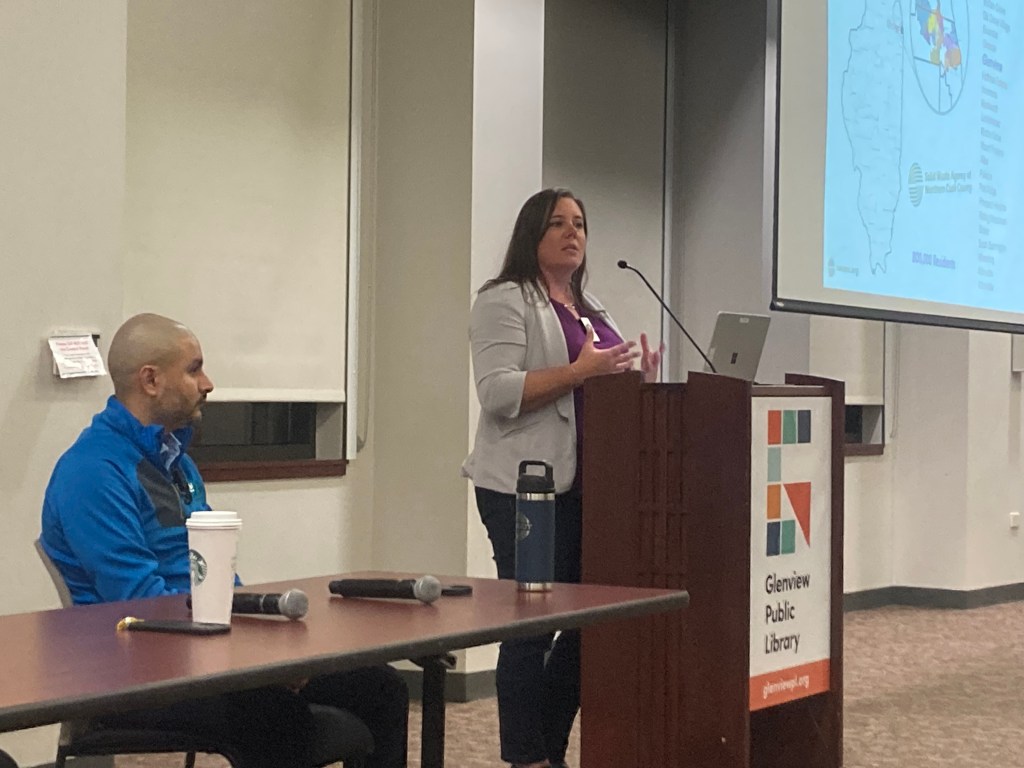Seven recycling trucks were destroyed by fire last year when residents made the mistake of putting lithium-ion batteries and other dangerous materials into their curbside recycling containers for pickup, a recycling company official revealed at a recent event in Glenview.
Javier Erazo, district manager of Groot Industries/Waste Connections told a room of more than 60 people gathered at the Glenview Library for an Oct. 27 program on proper recycling, “We probably deal with fires on a daily basis during certain seasons.
“Sometimes we’ll have a fire, we’ll extinguish it and then, within that same area, the second shift will come in hours later and something else will ignite.”
Co-sponsored by Greener Glenview, “Recycling: Myth vs. Reality,” included representatives from the Solid Waste Agency of Northern Cook County (SWANCC) and Groot/Waste Connections, who explained how the suburban recycling system works, outlined materials that are acceptable for curbside recycling and at drop-off sites, shared new initiatives that are set to launch and answered audience questions.
Glenview residents, like a number of other suburban communities, receive waste hauling services and collection of recyclables from Groot, which was acquired by Waste Connections in 2017.
Glenview is also a member of SWANCC, an intergovernmental agency that disposes of collected waste, while also offering special services for proper disposal of items that cannot be recycled but should also stay out of landfills.
When garbage is collected, it is taken to SWANCC’s Glenview Transfer Station where it is loaded into semi-trucks and hauled to the Winnebago Landfill south of Rockford, explained Theresa Greinig, education coordinator for SWANCC.
The 23 communities that are members of SWANCC generate about 250,000 tons of garbage for the landfill each year, Greinig said.
When recycled materials are collected from within the village, they are taken to material recovery facilities where they are sorted and prepared for recycling, Erazo said.
Items that are improperly placed in recycling carts, like batteries, hypodermic needles and diapers, can endanger workers who manually sort materials that enter the material recovery facilities, he noted.
According to SWANCC, items that are acceptable for curbside recycling carts include:
• Glass bottles and jars
• Metal, steel and aluminum cans and containers
• Paper, magazines, cartons and flattened boxes
• Plastic bottles and jugs with their caps on
All materials should be clean and not placed in bags, according to SWANCC officials.
The following items should not be recycled:
• Batteries
• Electronics
• Hypodermic needles
• Plastic bags and wrap
• Diapers and tissues
• Food and liquid
• Shredded paper
• Clothing and shoes
• Hoses, wires, cords and hangers
Glenview residents with questions of “what goes where” can use the village’s Recycle Coach search at https://www.glenview.il.us/sustainability. Garbage and recycling schedules are also available.
More information about curbside recycling guidelines can be found at www.swancc.org.
SWANCC also offers special one-day events for disposal of electronics and document destruction, with dates available on the agency’s website.
Beginning in December, SWANCC will begin collecting latex paint, said Christina Seibert, executive director, Details of how the program will work are forthcoming, she added.
In January, drop-off sites for batteries—lithium, alkaline and rechargeable—will also be available at certain retail locations, Seibert said.
Recently, SWANCC launched the Feed the Cart campaign to encourage recycling of proper materials and raise awareness. Ads featuring Loop, the “friendly recycling cart,” will appear on billboards, transit ads, and social media, Seibert said.
“We really are looking at this as the most funding we’ve had for recycling education in a very long time,” she noted.
